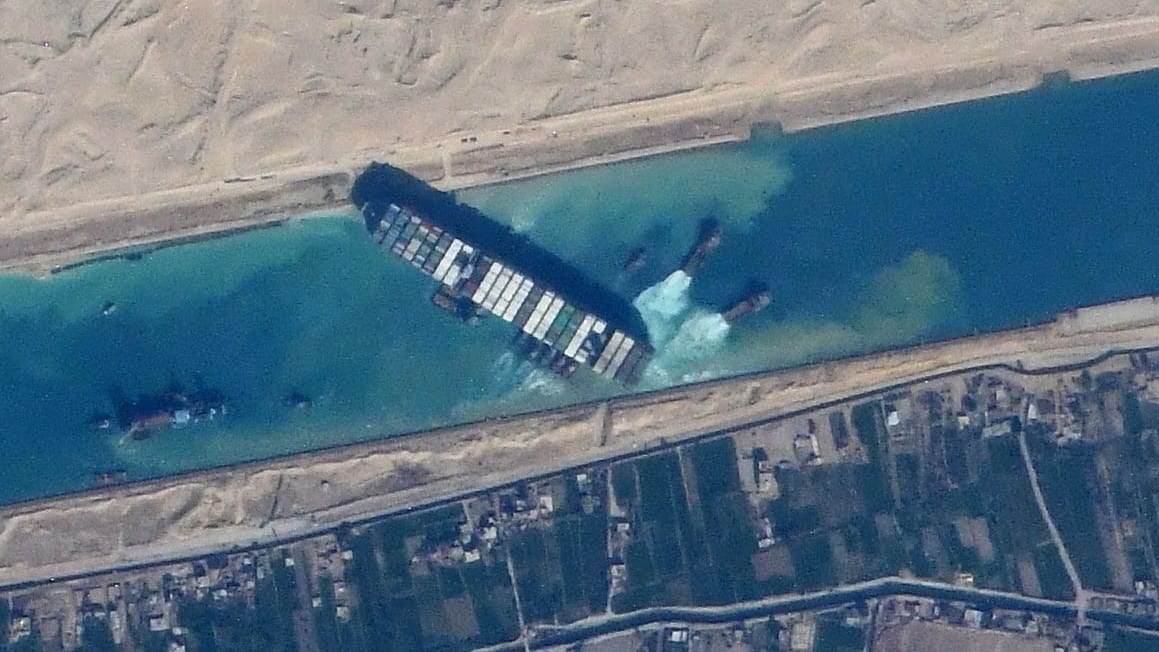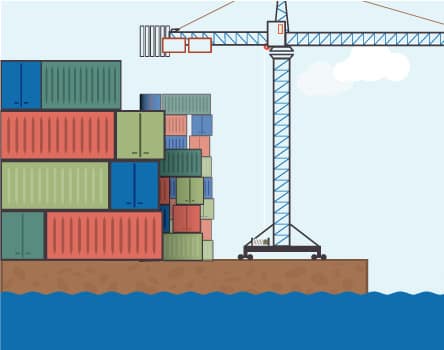On March 29, it came loose. The ship was impounded in Great Bitter Lake. The Suez Canal Authority sued them for $900M. Workers were stranded for 106 days until a settlement was reached.
For six days and seven hours in March 2021, the hulking container ship Ever Given was stuck in the Suez Canal. Under most circumstances, a boat stuck in a distant canal would be a story of minor intrigue at best. Yet this stuck boat just so happened to block 12% of global trade in the middle of a pandemic that was already stressing supply chains.
With people still bored and stuck inside from the world’s longest winter, this business nightmare turned into a pop culture phenomenon. Supply chain management became a spectator sport, and the internet came up with some of the funniest memes I’ve seen in a long time. And yes, in true 2021 fashion, the memes included sea shanties too.
On March 29 at 4:30 in the morning, 14 tug boats and a king tide dislodged the unlucky Ever Given. If this were a movie, this is the point at which the credits would roll, as the story is over.
But regrettably, this isn’t the movies! While the rest of the world moved on, the sordid saga of the Ever Given continued.
The Ever Given didn’t exactly sail off into the sunset
If you were paying attention to the media around the Ever Given, you could be forgiven for thinking that once the ship was freed, it just…drove off. However, much like when you get into a car accident, it doesn’t work that way. Having a ship run aground like that for days on end is really bad.
The Ever Given was pulled into the Great Bitter Lake, which is a large lake located in the middle of the Suez Canal between the southern entry point, the Gulf of Suez, and northern exit point, Port Said. Think of it like a section of highway where a 2-lane road becomes, for a brief time, a 3-lane road to allow for passing.
While pulled over, divers inspected the vessel for damage. Very luckily, the Ever Given was not damaged during the incident. This is the second major stroke of luck experienced by the Ever Given, which – let’s not forget – could have been stranded for WEEKS without the help of an unusually large tide. This luck also extended to other boats that were stuck in traffic, but fortunately all able to pass by April 3.
The Ever Given got sued by the Suez Canal
No, that is not a typo. The Suez Canal Authority (SCA) was pretty mad about the Ever Given blocking traffic. In particular, the SCA was not happy about all the revenue they lost during the blockage or the cost of the salvage operation.
The ship was later seized in Ismailia, a city in Egypt along the Suez Canal, upon request of the SCA. The SCA was requesting compensation to the tune of $916 million, which included $300 million for salvage and another $300 million for “loss of reputation.” The ship manager found this decision by the SCA to be “extremely disappointing.”
Last we read about it, May 25, an Egyptian court rejected an appeal to free the Ever Given. That means the Ever Given, and most of its crew, are still stuck in a port in Ismailia. The SCA’s requested compensation has since dropped to $600 million, and the case is still pending. No telling how this is going to shake out.

The global economy didn’t get hit as hard as it could have
For a while, there were a lot of concerns that the Suez Canal blockage was going to damage the global economy. This was not entirely unfounded, either, because – as stated above – the Ever Given came unstuck earlier than any reasonable person could have expected. That’s not to say we got off scot-free, though!
Semiconductors were already experiencing a shortage, which affected the price of electronics. Garden gnomes, of all things, were hard to come by. Beyond a few examples like that, it’s hard to blame any specific shortage on the Suez Canal blockage right now, as we’re still experiencing bizarre impacts from the COVID-19 pandemic. For example, lumber has been unbelievably expensive lately, but that’s entirely unrelated to the canal blockage!
The freight shipping industry at large is starting to question their operations
Perhaps the most important impact to come from the Suez Canal blockage was that it scared freight shippers and other supply chain experts. Plainly speaking, the Panama Canal and Suez Canal are two major global shipping chokepoints. Combine that with the fact that container ships have been continuously growing in size, an accident was bound to happen. It’s a small miracle that it wasn’t worse.
It’s hard to know exactly what experts make of situations like the Suez Canal blockage, as many of the conversations take place in board rooms and on private Zoom calls. From our research of public-facing headlines, though, there are five common themes in the post-mortems that experts have written:
- The supply chain is surprisingly vulnerable. There are two narrow canals that control an enormous amount of freight traffic in the world. On top of that, a surprising amount of fires and wrecks have plagued container ships in the last few decades. Reading about the freight shipping industry is like reading about aviation 40 or 50 years ago.
- We’re all connected – for better or worse. Modern trade means that you can get goods from any country in the world at a great cost. However, the minute supply chains break, there is serious trouble as many countries over-specialize in specific industries.
- Stranded workers have been in the spotlight. In general, workers around the world are fighting for their rights. Seafaring employees often do their work in silence as their work is hard to understand and far away. But when you have a bunch of people stuck in port for months on end, that’s a lot more noticeable! Seafaring is long, hard, thankless work and the sea shipping industry is going to have to reckon with that.
- Freight forwarders have increased their ability to find alternate routes. Between the COVID-19 pandemic and the Suez Canal blockage, frieght forwarding companies have learned how to be creative. Sometimes sea voyages are broken into trips with sea, train, and road segments. Other times, sea shipping is replaced with air shipping. Freight companies have, out of necessity, figured out multiple ways to transfer goods across the world for any given route.
- Lean supply chains are falling out of favor. For much of the 2010s, the lean supply chain reigned supreme. It was efficient and inexpensive, and a perfect way to get everything to arrive just-in-time! Until it wasn’t. As it turns out, operating without backup plans has left a lot of companies in the lurch lately. As such, resilence is starting to look more attractive than raw efficiency.
Final Thoughts
In many ways, the story of the Ever Given is a story of incredibly bad luck followed by incredibly good luck. The impacts of the the Suez Canal blockage were not nearly as bad as they could have been, although a lot of people are still dealing with the fallout. The workers stuck in port, in particular, really got a raw deal.
Still, this might be just scary enough to inspire business leaders to change things up for the better. Here’s hoping!




